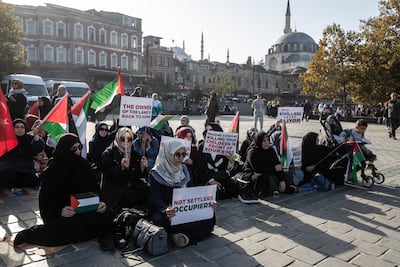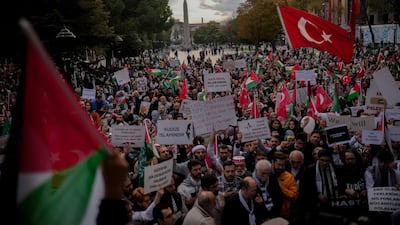Live updates: Follow the latest news on Israel-Gaza
If there is one thing that will forever be a source of regret for Salama Al Bayyaa, it is that the last video call with his mother did not happen.
Just before the call was scheduled to take place, his family’s house in central Gaza was hit. The strike killed his eight brothers and sisters, his parents and his siblings’ families – between 50 to 60 people.
Mr Al-Bayyaa, who has lived in Istanbul since 2021, is now among the many Gazans mourning from afar as the death toll from Israel's war on the Palestinian enclave continues to increase.
“I told my mum, 'I’ll video call you tonight because I’m at work right now,'” Mr Al-Bayyaa, 25, told The National. His mother warned him the call could be their last.
“I couldn’t do a video call because I was at work,” he explained from a co-working space in the western Istanbul district of Basaksehir. “I will regret that for the rest of my life.”
Thousands of Palestinians whose families have been killed in Israel’s air strikes and ground incursion in Gaza cannot return home to say farewell to their relatives, who are often buried in mass graves in farms, back gardens and stadiums, because cemeteries are full.
More than 11,500 Gazans, including at least 4,500 children, have been killed in the besieged strip since Israel launched strikes in response to the October 7 attacks by Hamas.
In Istanbul, Mr Al-Bayyaa is grieving alone. Turks across the political spectrum largely support Palestine, analysts say, while President Recep Tayyip Erdogan and senior politicians have attended rallies condemning Israel’s actions.
Mr Al-Bayyaa prefers to hide how he feels. “I am lost,” he said, his slim frame sinking into the sofa. “It’s my grief, so I don’t show people. When I want to be depressed, it’s at night.”

Turkey has diplomatic ties with the Palestinian Authority and Israel. Ankara renewed relations with the country last year to improve co-ordination across the Eastern Mediterranean.
Mr Erdogan initially appeared keen to act as a mediator in the conflict, echoing his position as an intermediary between Moscow and Kyiv since the start of the war in Ukraine.
Turkey’s ties to Hamas and connections with Israel positioned it as one of the few nations able to talk to both parties.
But the Turkish government’s position regarding the conflict has changed noticeably in recent weeks. It has become increasingly critical of Israel as the civilian death toll in Gaza rises. Israel and Turkey have withdrawn their respective ambassadors, although they have not officially downgraded relations.
Mr Erdogan and Israeli Prime Minister Benjamin Netanyahu recently swapped bitter statements, in the latest round of sharp exchanges between their countries since the Hamas attacks that killed 1,200.
“Rather than standing against the wave of social reaction, I suppose the Turkish government is trying to surf on it because there are so many competitors in the conservative realm,” said Hasan Selim Ozertem, a political analyst in Ankara.
Other experts say this does not bode well for Turkey’s future relations with Israel. The two countries downgraded diplomatic ties in 2011 over a deadly Israeli raid on a ship carrying Turkish citizens attempting to reach Gaza. Ankara’s current stance could make efforts to repair ties more difficult.
“As Israel was already hesitant in entering this normalisation process in the first place, and the fact that this is the second normalisation process with Turkey this past decade that encountered a crisis after less than two years, will make it very difficult for Israel to trust Turkey again,” said Gallia Lindenstrauss, a senior fellow at the Institute for National Security Studies in Tel Aviv.
But while Mr Erdogan’s rhetoric against Israel has grown fiercer, and diplomatic relations have been strained, trade continues.
“There are many private actors on both sides interested in ensuring that trade relations remain intact,” Ms Lindenstrauss explained.
Turkish exports to Israel were worth $7 billion in 2022, representing nearly 3 per cent of all outward sales, according to the Turkish Statistical Institute. The country is also a transit country for tens of thousands of barrels a day of Azerbaijani crude oil shipped to Israel.

Meanwhile, Palestinians in Istanbul feel that Turkey, like some Arab Muslim nations, could be doing more to condemn Israel.
One of those is Yousef Almqayyed, 31, who moved to the Turkish city in 2021, following a period of severe depression after the conflict between Israel and Hamas in May that year.
Eight members of his immediate family and 21 other relatives were killed in Israeli air strikes on October 14.
“They did not have traditional burials,” Mr Almqayyed said. “Turkey's position is blah blah blah – there are no actions. I'm disappointed.”
For his part, Mr Al-Bayyaa plans to go back to Gaza as soon as the war is over, to tile his family’s graves and search for a surviving niece and nephew.
A few days after the deadly strike on his family's house, a brother-in-law told him that his sister Amnah’s four children were killed in another bombing.

